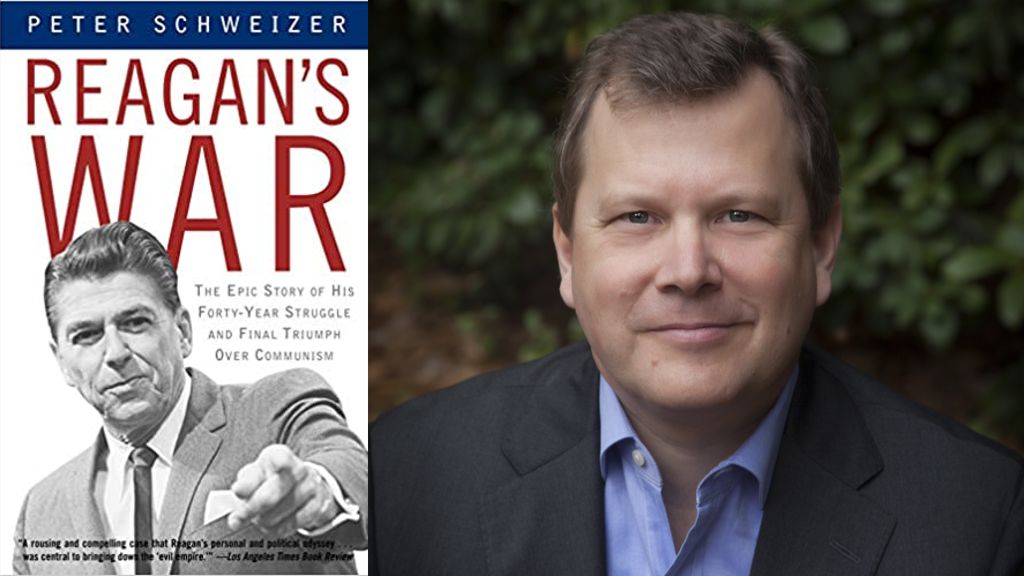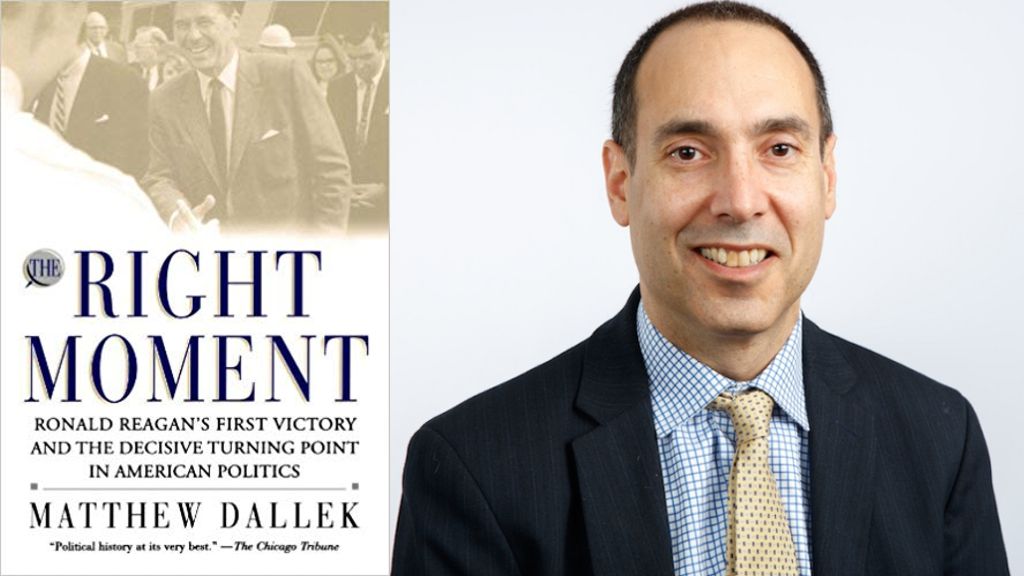Reagan’s War is the story of Ronald Reagan’s personal and political journey as an anti-communist, from his early days as an actor to his years in the White House. Challenging popular misconceptions of Reagan as an empty suit who played only a passive role in the demise of the Soviet Union, Peter Schweizer details Reagan’s decades-long battle against communism.
A meticulously researched and penetrating analysis of the Cold War, and the man who ended it. Peter Schweizer delves into the origins of Ronald Reagan’s vision of America, and documents his consistent, aggressive belief in confronting the Soviet Union diplomatically, economically, and militarily.
Ronald Reagan is often dismissed as an “amiable dunce,” a genial actor who simply mouthed whatever slogans his right-wing puppet masters put in front of him. Reagan’s War brilliantly overturns this myth. Drawing on private diaries dating from Reagan’s days as an actor and extending through his presidency, Peter Schweizer, a well-known historian of the Cold War, shows that Reagan’s fervent anticommunism marked every era of his life and was the driving force behind his policies as president.
Schweizer explores Reagan’s involvement with anticommunist liberals in Hollywood and his role as a secret informer for the FBI. Reagan’s outspoken criticism of d?tente in the late 1960s and his forceful advocacy for the overthrow of the USSR drew the attention of Soviet officials, who began a KGB file on him when he was still governor of California. By the time he was elected president, they viewed him as a serious threat to their interests. Reagan’s War shows just how right they were, presenting compelling evidence that Reagan personally mapped out and directed a campaign to bankrupt the Soviet Union and wage an economic and political war against Moscow.
In telling the story of Reagan’s ultimate triumph, Schweizer also brings to light dozens of previously unknown facts about the Cold War, based on secret documents obtained from archives in Russia, Germany, Poland, Hungary, and the United States. Among his many startling revelations are Kissinger’s private deals with Soviet leaders that protected his own political viability while allowing the Soviets to pursue their goals within their own sphere; a North Korean and East German plot to assassinate Reagan in 1983; Reagan’s secret funding of Solidarity in Poland; and the behind-the-scenes support Soviets and East Germans provided for European and American peace movements, as well as their clandestine contacts with U.S. government officials.
A fresh, often startling look at Ronald Reagan and his central role in winning the war for global dominance in the 1980s, Reagan’s War is a major work of twentieth-century history.

Editorial Reviews
From Publishers Weekly
The Cold War rhetoric of the subtitle is completely apropos to this hagiography, which gives the Gipper full credit for bringing down the Soviet Union. Schweizer is a fellow at Stanford’s Hoover Institution and coauthor, with Caspar Weinberger (Reagan’s secretary of defense) of The Next War. Using Reagan’s own files and papers, and other newly released material, Schweizer demonstrates Reagan’s development as a critic and determined opponent of communism and of the Stalinist Soviet Union. Schweizer depicts Reagan, from the beginning, regarding tactics and realpolitik as more important than ideas; in the process, the author does not carefully distinguish (as Reagan and most others of the era did not) Stalinism and what came after from communism as an ideal. Reflection, study and conviction led Reagan to the belief that steady pressure systematically applied would eventually bring down a Soviet Union whose legitimacy rested ultimately on force. He remained committed to this vision as his status rose in a Republican Party itself increasingly committed to a detente that Reagan argued both weakened the West and prolonged the survival of its rival power. Schweizer takes pains to establish the widespread belief in the West by 1980 that the balance of economic, military, and political forces had irrevocably shifted in favor of the U.S.S.R. On assuming the presidency, Reagan brought about a huge change in U.S. policy, abandoning defensive counterpunching and actively prosecuting a Cold War the U.S.S.R. had never ceased to wage. Schweizer argues that Reagan spent as much time convincing his own lieutenants to abandon the defensive as he did confronting the Russians. It’s a story that is clearly and stirringly told, but without seriously entertaining dissenting views on its iconic subject.
Copyright 2002 Reed Business Information, Inc.

From Library Journal
Ronald Reagan remains a polarizing figure. Critics have dismissed him as an “amiable dunce,” while supporters see him as an underappreciated political genius. This book falls squarely into the latter camp, arguing that Ronald Reagan “won the Cold War.” The consensus among experts is that credit for our Cold War victory is widely shared by Harry Truman and the policies he developed after World War II; the American people who suffered and died to protect freedom; our allies, who were part of the decades-long effort; Mikhail Gorbachev for his efforts to open up the Soviet Union; and finally Reagan for his policies toward what he called “the evil empire.” Few serious analysts, however, would go as far as Schweizer (Disney: The Mouse Betrayed) does in attributing victory almost solely to Reagan. The strength of this book is found in the early chapters, where the author traces the development of Reagan’s anticommunism from his days as head of the Hollywood Screen Actors Guild to his entry into politics in California. It demonstrates Reagan’s consistent view over time and how his commitment to freedom animated his actions. The book’s weakness is in its political bias, which unfairly dismisses the efforts by several generations and other Presidents to stem, then turn, the tide of communism. Suitable for large and university libraries. –Michael A. Genovese, Loyola Marymount Univ., Los Angeles Copyright 2002 Reed Business Information, Inc.

Review
“Peter Schweizer has written a profound and important book which is also compulsive reading. The Ronald Reagan he depicts is a man utterly consistent in his beliefs and analysis from his earliest forays into politics. While others were distracted by short-term considerations, President Reagan single-mindedly pursued his vast strategic goals–and he succeeded. Was there ever a better example of statesmanship in action?” —Lady Margaret Thatcher
“Ronald Reagan played an invaluable role in bringing about the fall of communism and ending the Cold War without resorting to military solutions. Without his great political sense and prudence, instead of the popping of champagne corks, the world would have heard real artillery shots. We [in the Solidarity movement] sensed President Reagan’s support and understanding and never had to ask for or demand it. This is not something easily found in the world of politics.” —Lech Walesa, former president of Poland
“In Reagan’s War, Peter Schweizer has given us a timely and skilled history of Ronald Reagan’s 40-year struggle against Communism that brings home the twin beacons he followed: we must be guided not by fear but by courage and moral clarity. This is a superb history that demonstrates why Reagan won the Cold War, and why it never would have been won without him.”
—Caspar W. Weinberger, Chairman, Forbes, Inc.
“A masterstroke. Schweizer uses the secret archives of the Soviet Union and its satellites to outline with amazing detail the seriousness of the Soviet threat, the failures of the American establishment, and the brilliance of Reagan’s strategy for victory. If you want to understand how we can win the war against Islamic extremists, study how Reagan achieved victory over communism in Reagan’s War.” —Newt Gingrich, former Speaker of the House

From the Inside Flap
A meticulously researched and penetrating analysis of the Cold War, and the man who ended it. Peter Schweizer delves into the origins of Ronald Reagan’s vision of America, and documents his consistent, aggressive belief in confronting the Soviet Union diplomatically, economically, and militarily.
Ronald Reagan is often dismissed as an “amiable dunce,” a genial actor who simply mouthed whatever slogans his right-wing puppet masters put in front of him. Reagan’s War brilliantly overturns this myth. Drawing on private diaries dating from Reagan’s days as an actor and extending through his presidency, Peter Schweizer, a well-known historian of the Cold War, shows that Reagan’s fervent anticommunism marked every era of his life and was the driving force behind his policies as president.
Schweizer explores Reagan’s involvement with anticommunist liberals in Hollywood and his role as a secret informer for the FBI. Reagan’s outspoken criticism of d’tente in the late 1960s and his forceful advocacy for the overthrow of the USSR drew the attention of Soviet officials, who began a KGB file on him when he was still governor of California. By the time he was elected president, they viewed him as a serious threat to their interests. Reagan’s War shows just how right they were, presenting compelling evidence that Reagan personally mapped out and directed a campaign to bankrupt the Soviet Union and wage an economic and political war against Moscow.
In telling the story of Reagan’s ultimate triumph, Schweizer also brings to light dozens of previously unknown facts about the Cold War, based on secret documents obtained from archives in Russia, Germany, Poland, Hungary, and the United States. Among his many startling revelations are Kissinger’s private deals with Soviet leaders that protected his own political viability while allowing the Soviets to pursue their goals within their own sphere; a North Korean and East German plot to assassinate Reagan in 1983; Reagan’s secret funding of Solidarity in Poland; and the behind-the-scenes support Soviets and East Germans provided for European and American peace movements, as well as their clandestine contacts with U.S. government officials.
A fresh, often startling look at Ronald Reagan and his central role in winning the war for global dominance in the 1980s, Reagan’s War is a major work of twentieth-century history.

From the Back Cover
“Peter Schweizer has written a profound and important book which is also compulsive reading. The Ronald Reagan he depicts is a man utterly consistent in his beliefs and analysis from his earliest forays into politics. While others were distracted by short-term considerations, President Reagan single-mindedly pursued his vast strategic goals–and he succeeded. Was there ever a better example of statesmanship in action?” —Lady Margaret Thatcher
“Ronald Reagan played an invaluable role in bringing about the fall of communism and ending the Cold War without resorting to military solutions. Without his great political sense and prudence, instead of the popping of champagne corks, the world would have heard real artillery shots. We [in the Solidarity movement] sensed President Reagan’s support and understanding and never had to ask for or demand it. This is not something easily found in the world of politics.” —Lech Walesa, former president of Poland
“In Reagan’s War, Peter Schweizer has given us a timely and skilled history of Ronald Reagan’s 40-year struggle against Communism that brings home the twin beacons he followed: we must be guided not by fear but by courage and moral clarity. This is a superb history that demonstrates why Reagan won the Cold War, and why it never would have been won without him.”
—Caspar W. Weinberger, Chairman, Forbes, Inc.
“A masterstroke. Schweizer uses the secret archives of the Soviet Union and its satellites to outline with amazing detail the seriousness of the Soviet threat, the failures of the American establishment, and the brilliance of Reagan’s strategy for victory. If you want to understand how we can win the war against Islamic extremists, study how Reagan achieved victory over communism in Reagan’s War.” —Newt Gingrich, former Speaker of the House
About the Author
Peter Schweizer is a fellow at the Hoover Institute and the author of several books on the history of the Cold War. He is currently at work on a biography of the Bush dynasty. He lives in Palo Alto, California.







